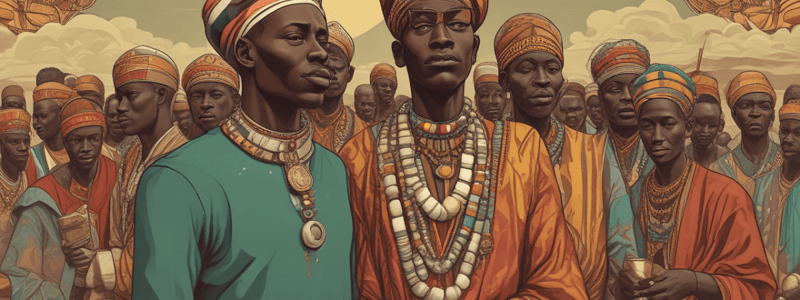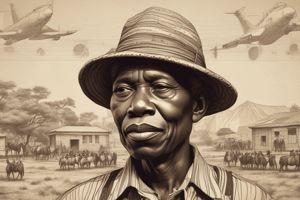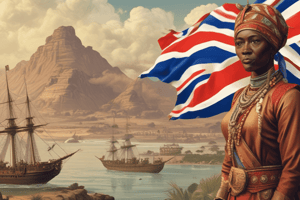Podcast
Questions and Answers
What is the primary role of oramedia in development programs, according to Ugboajah?
What is the primary role of oramedia in development programs, according to Ugboajah?
What does Moemeka describe as a characteristic of traditional African communication?
What does Moemeka describe as a characteristic of traditional African communication?
What is the contrast between rural and urban life in Africa, according to Moemeka?
What is the contrast between rural and urban life in Africa, according to Moemeka?
What is the significance of traditional African communication in modern society?
What is the significance of traditional African communication in modern society?
What is the impact of modernization on traditional African communication?
What is the impact of modernization on traditional African communication?
What is the primary characteristic of traditional African societies, according to Moemeka?
What is the primary characteristic of traditional African societies, according to Moemeka?
What is the role of oramedia in promoting social harmony?
What is the role of oramedia in promoting social harmony?
What is the significance of the supremacy of the community in traditional African societies?
What is the significance of the supremacy of the community in traditional African societies?
What is the impact of modern communication technology on traditional African communication?
What is the impact of modern communication technology on traditional African communication?
What is the significance of understanding traditional African communication in the context of modernization?
What is the significance of understanding traditional African communication in the context of modernization?
What was a common issue that women faced in Black organizations during the 1960s?
What was a common issue that women faced in Black organizations during the 1960s?
According to Toni Cade, what was the reason given by Black men for women to be supportive and patient?
According to Toni Cade, what was the reason given by Black men for women to be supportive and patient?
What was the experience of Black women who questioned or rejected a patriarchal Black movement?
What was the experience of Black women who questioned or rejected a patriarchal Black movement?
What was a common way that Black organizations addressed women's concerns?
What was a common way that Black organizations addressed women's concerns?
What is a key issue that Toni Cade raises about the role of women in Black organizations?
What is a key issue that Toni Cade raises about the role of women in Black organizations?
What is a common experience of Black women in the Black movement, according to bell hooks?
What is a common experience of Black women in the Black movement, according to bell hooks?
What is a criticism that Toni Cade makes about the way women are treated in Black organizations?
What is a criticism that Toni Cade makes about the way women are treated in Black organizations?
What is a key aspect of the relationship between Black women and the Black movement, according to Toni Cade?
What is a key aspect of the relationship between Black women and the Black movement, according to Toni Cade?
What is a consequence of the way women are treated in Black organizations, according to Toni Cade?
What is a consequence of the way women are treated in Black organizations, according to Toni Cade?
What is a key theme in the writings of Toni Cade and bell hooks?
What is a key theme in the writings of Toni Cade and bell hooks?
What is the title of the book written by Delpit that explores cultural conflict in the classroom?
What is the title of the book written by Delpit that explores cultural conflict in the classroom?
Who wrote the book 'The African Personality in America: An African-Centered Framework'?
Who wrote the book 'The African Personality in America: An African-Centered Framework'?
What is the title of the book written by Hernandez Sheets and Hollins that focuses on racial and ethnic identity in school practice?
What is the title of the book written by Hernandez Sheets and Hollins that focuses on racial and ethnic identity in school practice?
Who wrote the book 'Climbing Jacob's Ladder: The Enduring Legacy of African-American Families'?
Who wrote the book 'Climbing Jacob's Ladder: The Enduring Legacy of African-American Families'?
What is the title of the book written by Du Bois that explores the experiences of African Americans?
What is the title of the book written by Du Bois that explores the experiences of African Americans?
Who wrote the book 'Countering the Conspiracy to Destroy Black Boys'?
Who wrote the book 'Countering the Conspiracy to Destroy Black Boys'?
What is the title of the book written by Freire that explores the pedagogy of the oppressed?
What is the title of the book written by Freire that explores the pedagogy of the oppressed?
Who wrote the book 'The Slave Community: Plantation Life in the Antebellum South'?
Who wrote the book 'The Slave Community: Plantation Life in the Antebellum South'?
What is the focus of the book 'Cultural Diversity and Education: Foundations, Curriculum, and Teaching'?
What is the focus of the book 'Cultural Diversity and Education: Foundations, Curriculum, and Teaching'?
Who wrote the book 'Introduction to the Foundations of American Education'?
Who wrote the book 'Introduction to the Foundations of American Education'?
Flashcards are hidden until you start studying
Study Notes
The Legacy of Colonialism in Africa
- The colonial encounter left a bitter taste in the relationship between Africans and their government, viewing the government as an oppressive and exploitative entity.
- This perception has not changed much with African politicians, leading to a bifurcated view of public life: the "civic public" and the "primordial public".
- The "civic public" is characterized by amoral codes of behavior and is seen as "the other", not representing the people.
- The "primordial public" is based on moral values, binding together members of the same natural and assumed kinship (including ethnic groupings).
Contrast Between Public Life Spheres
- In the "civic public", cheating the state is seen as prudence, and there is no sense of morality in government.
- In the "primordial public", high ethical and moral principles prevail, and Africans are willing to lay down their lives for their group members.
- Foreign religions like Christianity and Islam can have moderating influences on the two publics, but this influence is limited and can exacerbate feelings of conflict.
Development of Civil Society in Africa
- Political democracy, private media ownership, and civil society organizations are leading to more diverse points of view being accommodated in civic communication.
- Many African countries have successfully held elections, although some leaders are recycled military dictators who are intolerant of criticism and press freedom.
- The sociopolitical climate and personalities of heads of government affect the exercise of freedom by journalists.
Economic and Globalization Trends
- Most African countries are poor, and many are ravaged by HIV/AIDS, but some national economies are improving.
- Countries are looking outward to attract foreign direct investors and seeking ways to benefit from globalization.
- The global clamoring for political democracy is giving greater voice to local activists who oppose government oppression.
Press Freedom and African Communication
- There are signs of perseverance against government oppression, and some gains in the fight for press freedom.
- African traditional communication is varied in form and is often viewed positively by scholars.
- Traditional communication attracts positive comments from scholars, who see it as effective for development programs and promoting cooperation and communalism.
- However, traditional communication is not unequivocally good or bad and depends on its use.
The 1990s: A Decade of Positive Change
- The 1990s saw an increase in scholars interested in women's issues and more Africana administrators, both male and female, who were sensitive to women's issues.
- The Emory University African American and African Studies program, led by an Africana woman director, established an endowed lecture series in the name of an African-American woman and a distinguished chair in the name of an Africana woman.
Professional Organizations and Africana Women
- Until the late 1980s and 1990s, Africana women had a limited presence in professional organizations, but they began to make their presence felt, not just through leadership positions but through participation at all levels.
- Organizations such as the National Council for Black Studies (NCBS), the African Heritage Studies Association (AHSA), and the Association for the Study of African American Life and History (ASALH) have contributed to professionalizing the field of African American Studies.
- These organizations have taken steps to achieve parity among women and men, including integrating women's issues and experiences into conference programs, recognizing women with awards, and initiating special projects devoted to women.
Women in Leadership Positions
- Bertha Maxwell Roddy was the founder and first president of the National Council for Black Studies and immediate past president of Delta Sigma Theta Sorority Inc.
- Delores P. Aldridge, a sociology and African American Studies professor, initiated summer administrative workshops, a summer fellowship program, and a national survey on Black/Africana Studies programs.
- Charsye Lawrence McIntyre and Barbara Wheeler, past president and vice president of the African Heritage Studies Association, respectively, organized a student commission to engage undergraduate and graduate students.
Historical Context: Women's Roles in Black Organizations
- In the 1960s, women in Black organizations were often relegated to secondary roles, such as manning telephones and making coffee, while men wrote position papers and decided on policy.
- Some organizations condescendingly allotted a few slots to women in the executive order or encouraged them to form separate caucuses.
- Women's roles were often seen as secondary to men's, with women being expected to be supportive and patient so that men could regain their manhood.
Afrocentric Ideas and Beliefs in Education
- Schools can foster Afrocentric ideas and beliefs through African American Studies and African languages, emphasizing cultural heritage.
- Approaches can include intracultural, intercultural, and cross-cultural methods to promote a positive cultural identity.
Limitations of the Study
- The study was based on a convenience sample of university students at two historically Black universities and may not be generalizable to the larger population.
- The questionnaire was constructed from assumptions about Afrocentric theory.
Key Concepts in Afrocentricity
- Afrocentricity has cultural values that have been passed down from generation to generation, but there is debate about the extent of how much has been passed down.
- Afrocentricity can be conceptualized as having several dimensions, including:
- Location, place, orientation, and perspective.
- Awareness/recognition of a collective African identity and heritage.
- General ideology and activity priorities placed on African survival and liberation.
- Specific activity (such as self-knowledge and African-centered values).
- A posture of resolute resistance toward anti-African forces and threats to African Diaspora survival.
Principles of Afrocentricity
- The seven principles of Nguzo Saba could be the basis of a simpler yet more comprehensive Afrocentric scale.
- Other principles include:
- Centeredness in African culture and experience.
- Symbols (of African identity, philosophy, language, and culture).
- Hierarchical orientation of life (adult orientation).
- "Twinness" of gender (equality of men and women and harmony between genders).
- Universality and African Diaspora recognition.
- Scholarship and research.
Importance of Afrocentricity
- Afrocentricity can aid Africans to revitalize their cultural identity.
- It can promote cultural diversity and education.
Studying That Suits You
Use AI to generate personalized quizzes and flashcards to suit your learning preferences.




